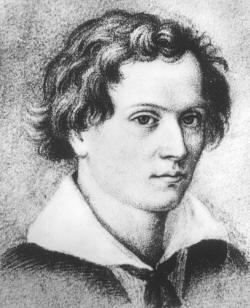

Queer Places:
Hauptstraße 24, 73547 Lorch, Germany
Werastraße 11, 70182 Stuttgart, Germany
Pragfriedhof Stuttgart
Stuttgart-Nord, Stadtkreis Stuttgart, Baden-Württemberg, Germany
 Eduard Friedrich Mörike (8 September 1804 – 4 June 1875)[1] was a German Lutheran pastor who was also a Romantic poet and writer of novellas and novels. Many of his poems were set to music and became established folk songs, while others were used by composers Hugo Wolf and Ignaz Lachner in their symphonic works.
Wilhelm Waiblinger was a
German poet and writer, today known for his "homoerotic relationship" with Eduard Mörike.
Eduard Friedrich Mörike (8 September 1804 – 4 June 1875)[1] was a German Lutheran pastor who was also a Romantic poet and writer of novellas and novels. Many of his poems were set to music and became established folk songs, while others were used by composers Hugo Wolf and Ignaz Lachner in their symphonic works.
Wilhelm Waiblinger was a
German poet and writer, today known for his "homoerotic relationship" with Eduard Mörike.
Mörike was born in Ludwigsburg. His father was Karl Friedrich Mörike (died 1817), a district medical councilor; his mother was Charlotte Bayer. After the death of his father, in 1817, he went to live with his uncle Eberhard Friedrich Georgii in Stuttgart, who intended his nephew to become a clergyman. Therefore, after one year at the Stuttgart Gymnasium illustre, Mörike joined the Evangelical Seminary Urach, a humanist grammar school, in 1818 and from 1822 to 1826 attended the Tübinger Stift. There, he scored low grades and failed the admission test to Urach Seminary, yet was accepted anyhow. At the Seminary he went on to study the classics, something that was to become a major influence on his writing, and he made the acquaintance of Wilhelm Hartlaub and Wilhelm Waiblinger. Afterwards he studied theology at the Seminary of Tübingen where he met Ludwig Bauer, David Friedrich Strauss and Friedrich Theodor Vischer. Many of these friendships were long-lasting. In Tübingen, with Bauer, he invented the fairyland Orplid – see the poem Song Weylas (You are Orplid) dating from 1831. Mörike became a Lutheran pastor and, in 1834, he was appointed vicar of Cleversulzbach near Weinsberg. In the Autumn of 1843 he stayed for over half a year with his friend Pastor Wilhelm Hartlaub (1804–1885) in the village of Wermutshausen, situated in the state of Baden-Württemberg in southern Germany. During this time he produced a drawing of the Wermutshausen Petruskirche, dating from the early 1800s. This drawing is speculated, due to the perspective, to be from a top-floor room of a local brewery, distillery, and guesthouse at the edge of town, which remains in operation today as Gasthaus und Manufaktur Krone Wermutshausen. In town there is also a Museum commemorating this visit, in which guests can see the room in which Mörike lived. For reasons of health, Mörike retired quite early, and in 1851 became professor of German literature at the Katharinenstift in Stuttgart.
Mörike retired in 1866. In the period from 1867 to 1873, the poet changed places and apartments several times. In 1867 he moved to Lorch, in 1869 back to Stuttgart, in 1870 toNürtingen, and in 1871 again to Stuttgart. In 1875 Mörike became bedridden. Shortly before his death, he reconciled with his wife at his bedside. Mörike was buried in Stuttgart'sPrague Cemetery, two years after its opening.
My published books: